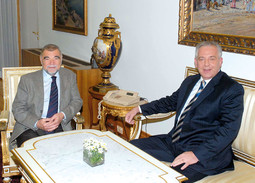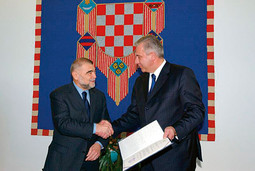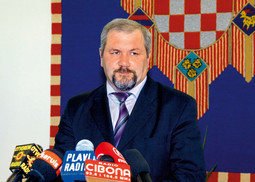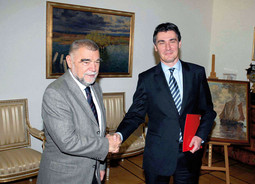Published in Nacional number 629, 2007-12-03
POLITICAL REPORT
Mesic ready to give Sanader the mandate to form a Government
After three days of consultations at the President's Office it has become evident that the issue of who will get the mandate to form a new Croatian Government has been resolved
 Stjepan Mesić and Ivo SanaderAs things now stand all of the uncertainty concerning the naming of a mandatary has been resolved – a new Government will be formed by Ivo Sanader. There were, therefore, no machinations coming from the President's Office on Pantovcak, just a simple respect of procedure and the Constitution, also evident from the events of 9 December 2003. The HDZ then, namely, won 66 seats in Parliament and Ivica Racan immediately that first night conceded defeat. Despite that fact Stipe Mesic followed in full the proper procedure and until the head of the Supreme Court, also the President of the State Election Commission, submitted an exact list of elected MP's, he did not proclaim a new mandatary. That this is precisely the case can be seen on the official web site of the Office of the President where, in a press release dated 9 December 2003, Mesic congratulates Sanader on his election victory and gives him the mandate to form a Government.
Stjepan Mesić and Ivo SanaderAs things now stand all of the uncertainty concerning the naming of a mandatary has been resolved – a new Government will be formed by Ivo Sanader. There were, therefore, no machinations coming from the President's Office on Pantovcak, just a simple respect of procedure and the Constitution, also evident from the events of 9 December 2003. The HDZ then, namely, won 66 seats in Parliament and Ivica Racan immediately that first night conceded defeat. Despite that fact Stipe Mesic followed in full the proper procedure and until the head of the Supreme Court, also the President of the State Election Commission, submitted an exact list of elected MP's, he did not proclaim a new mandatary. That this is precisely the case can be seen on the official web site of the Office of the President where, in a press release dated 9 December 2003, Mesic congratulates Sanader on his election victory and gives him the mandate to form a Government.
This year that is going to happen Wednesday, 12 December, three days, that is, later than in 2003, which is logical, as this year's elections were held Sunday, 25 November, while four years ago they fell on Sunday, 23 November. Regardless of who writes what and where, any other course of action on the part of Stipe Mesic would be both frivolous and irresponsible and could leave a trail of hundreds of loose ends and the speculation of the dissatisfied, who might seek the cause of their failure in a violation of procedure. This way everybody will have to hold their tongue and look for the causes of their failures at the polls in their work, program and comportment. It is already clear how the ruling coalition will look, and this was also evident to President Mesic, something he indirectly confirmed in an interview for Croatian Radio. On Saturday, 1 December, he said that the HSLS-HSS coalition would decide the victor of the elections, that is to say, who would get the mandate to form a new Government.
A day or two earlier Josip Friscic and Djurdja Adlesic had told Mesic on Pantovcak that they felt that it was in good order to discuss a new Government with the relative winner of the elections – that being the HDZ. Only if they are not satisfied with the outcome of these discussions will they then open serious discussions with the SDP. It is not very likely to come to these more serious discussions as these elections are far to important to Sanader to gamble away a victory already in his grasp, and he will be ready for a deal in any event. There is in this a reserve possibility that has emerged in the form of the HNS. We have learned from the leadership of Pusic's and Cacic's party that they are prepared to act as a sort of "back-up" to a Sanader administration. Because of their system of values and political orientation they do not wish to participate in forming a HDZ-led Government, but they will also not allow a Sanader administration, once formed, to be blackmailed by unreasonable demands from coalition partners in Parliament, demands that could slow Croatia on the road to EU membership and hurt its strategic goals. Every citizen of this country should greet this kind of reasoning on the part of Cacic and the HNS, as it is exactly this kind of decision from the leadership of the HNS that is a guarantee Croatia's continuing Stjepan Mesić and Ivo Sanader progress.
Stjepan Mesić and Ivo Sanader progress.
That the people at the SDP are at the end of their tether and that things do not look good for them is evident from Milanovic's move to chuck Jurcic from the role of candidate for the post of Prime Minister, i.e. the potential mandatary to form new administration. A move made far too late and an unnecessary one that can only be the product of a desperate man who is, in doing so, trying to buy and fix something that is already now beyond repair. Had Milanovic had the courage to do so he would have made that move at the latest in late September. It would have been judged by all as a responsible move on the part of a man ready to personally take on the entire burden of the fate of both his party and the country. This way, a week after the polls closed, to bring down the platform on which the SDP won the electorate's widest support to date, is for me quite baffling. Whoever it was that talked Milanovic into making the move has buried his knife in his back, but it is Milanovic himself who is at fault for the decision, and it is he who will have to bear the responsibility for it.
Up to that decision I was certain that, thanks to an excellent showing at the polls, Milanovic would hold on the post of SDP boss; after the dismissal of Jurcic, a move that personally offended him, the situation could take a turn downhill for Milanovic. And in this unstoppable plunge, there will not be many in the SDP that will extend a saving hand. Perhaps I am mistaken, perhaps Milanovic has in this short time created an inter-party infrastructure strong enough to protect him and shield him from all attacks.
 Silvano HreljaAs far as support for a new mandatary and who took what kind of position in discussions with the President, it is precisely based on what happened at the President's Office in three days of consultations that I base the conclusion that the issue of who will get the mandate to form a new administration has been resolved. The only ones to declare their positions openly in the first round are the members of the Roma and Muslim minorities. Semso Tankovic did, however, set a little distance telling Mesic that if the HDZ were to collect 77 votes he too would be prepared to sign an agreement with the party. The other minority MP's, led by Pupovac's SDSS, have all to the last one said that they would by no means be the seventy-seventh vote needed to decide who the new mandatary would be. That, in their opinion, would not be proper given the method by which they are elected, and it should be noted that some of them were elected to Parliament with as little as 300 votes.
Silvano HreljaAs far as support for a new mandatary and who took what kind of position in discussions with the President, it is precisely based on what happened at the President's Office in three days of consultations that I base the conclusion that the issue of who will get the mandate to form a new administration has been resolved. The only ones to declare their positions openly in the first round are the members of the Roma and Muslim minorities. Semso Tankovic did, however, set a little distance telling Mesic that if the HDZ were to collect 77 votes he too would be prepared to sign an agreement with the party. The other minority MP's, led by Pupovac's SDSS, have all to the last one said that they would by no means be the seventy-seventh vote needed to decide who the new mandatary would be. That, in their opinion, would not be proper given the method by which they are elected, and it should be noted that some of them were elected to Parliament with as little as 300 votes.
The party that openly said they would back the HDZ, but not as the 77th but rather as the 78th vote, was the HSU. The only one to entirely openly and transparently say that he would give his vote to the HDZ is they needed to come to the magic number of 77 votes is Anto Djapic. He told Mesic that he was not seeking anything in return from the ruling party and that he feels that they have the moral right to form a Government. This is an exceptionally courageous and correct move on the part of Djapic, especially considering that it was precisely Sanader who ruined him in the election campaign with the "A vote for the HSP is a vote for the SDP" slogan. Not even the IDS or the HNS are willing to sign anything with the SDP regarding a post-election coalition, as, by all accounts, they are not confident that Milanovic has the strength to form a Government. And neither of the county prefects, neither Jakovcic or Cacic, are obtuse, and they want a winning situation for themselves, their parties and their counties, and do not wish to sink together with the SDP's ambitions to put together a Government.
 Stjepan Mesić and Zoran MilanovićBesides, we have learned from people close to the IDS that they are openly saying that Istria got more during the rule of Sanader's HDZ than it did during the administration of Racan's SDP, when Jakovcic was a member of a cabinet he ended up leaving. Cacic is of the same opinion, and has to keep his own county and its progress in mind over the coming four years, something that cannot be seen through if the county prefect is at war with the national administration. We have already outlined the crucial relations of the HSLS-HSS coalition towards the HDZ, so that simple math shows that the HDZ could in the end have a firm majority in Parliament of at least 85 MP's. This math is also clear to Stipe Mesic, who will certainly not allow the last two years of his mandate to pass at war with a Sanader administration. The last thing he needs is to rock the boat, as it is very likely that President Mesic is right now, two years ahead of the end of his term, laying the groundwork for a new stage in his political activity. Anyone who believes he will retire from politics in his 75th year, at a time when he can do 50 push-ups without difficulty and when his mind is ticking like the best IWC wristwatch, is seriously mislead. Now that, after the death of Racan and the latest of Milanovic's blunders, the left has lost a leader, the question is – is it not precisely Stipe Mesic who, after his term as President is up, is the only one, as a reactivated member and likely president of the HNS, that has the moral right and sufficient strength to rally the entire left for the parliamentary elections four years down the road? This appears to me to be a very likely scenario and I would be willing to wager a bet that that is exactly how it will play out.
Stjepan Mesić and Zoran MilanovićBesides, we have learned from people close to the IDS that they are openly saying that Istria got more during the rule of Sanader's HDZ than it did during the administration of Racan's SDP, when Jakovcic was a member of a cabinet he ended up leaving. Cacic is of the same opinion, and has to keep his own county and its progress in mind over the coming four years, something that cannot be seen through if the county prefect is at war with the national administration. We have already outlined the crucial relations of the HSLS-HSS coalition towards the HDZ, so that simple math shows that the HDZ could in the end have a firm majority in Parliament of at least 85 MP's. This math is also clear to Stipe Mesic, who will certainly not allow the last two years of his mandate to pass at war with a Sanader administration. The last thing he needs is to rock the boat, as it is very likely that President Mesic is right now, two years ahead of the end of his term, laying the groundwork for a new stage in his political activity. Anyone who believes he will retire from politics in his 75th year, at a time when he can do 50 push-ups without difficulty and when his mind is ticking like the best IWC wristwatch, is seriously mislead. Now that, after the death of Racan and the latest of Milanovic's blunders, the left has lost a leader, the question is – is it not precisely Stipe Mesic who, after his term as President is up, is the only one, as a reactivated member and likely president of the HNS, that has the moral right and sufficient strength to rally the entire left for the parliamentary elections four years down the road? This appears to me to be a very likely scenario and I would be willing to wager a bet that that is exactly how it will play out.
The HNS raises political standards
The key breakthrough made on the Croatian political scene over the past days has been made by the leaders of the Croatian People's Party. The HNS has decided to take a firm position and not allow the new Croatian Government to be blackmailed, regardless of the fact that their political opponent Ivo Sanader will put it together. The intention of the Croatian People's Party is to be Sanader's reserve support in Parliament, which means that they wish at all costs to prevent any possible coercion on the part of Sanader's coalition partners. Above all this relates to demands that could slow Croatia on the road to European Union membership, or would threaten the country's financial stability.
In the event that Sanader lost the support of his coalition partner in Parliament, he would get it from the HNS's seven MP's. Because of its political orientation and system of values the party led by Vesna Pusic and Radimir Cacic will not enter into any kind of post-electoral agreement with the HDZ, nor will it take part in putting together a HDZ administration. This position on the part of the HNS, besides being a precedent on the Croatian political scene, also represents a guarantee of Croatia's further progress and the continuing process of moving down to road to European Union and NATO membership.
Related articles
Why the State Attorney's Office did not draft the Ina contract
Former Croatian President Stjepan Mesic was one of the first in Croatia to call for the public release of the Veteran's Register. Nacional's reporter… Više
Latest news
-
28.10.2010. / 14:15
'A profitable INA is in everyone's interest'
-
28.10.2010. / 09:38
Sanader’s eight fear SDP — Won’t bring down Government
-
21.10.2010. / 15:02
Interior Ministry turned a blind eye on Pukanic assassination
-
20.10.2010. / 09:34
Barisic could bankrupt HDZ




